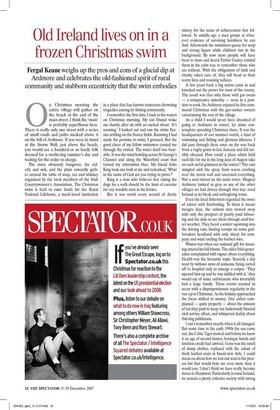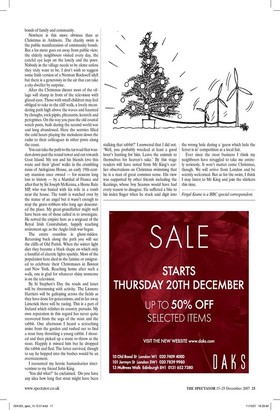Old Ireland lives on in a frozen Christmas swim
Fergal Keane weighs up the pros and cons of a glacial dip at Ardmore and celebrates the old-fashioned spirit of rural community and stubborn eccentricity that the swim embodies n Christmas morning the entire village will gather on the beach at the end of the main street. I think the 'main' is probably superfluous here. There is really only one street with a series of small roads and paths stacked above it on the hill of Ardmore. If you were to stand at the Storm Wall, just above the beach, you would see a hundred or so hardy folk dressed for a sweltering summer's day and waiting for the order to charge.
The more obviously hungover, the elderly and sick, and the plain cowardly gather around the table of soup, tea and whiskey organised by the local members of the Irish Countrywomen's Association. The Christmas swim is held to raise funds for the Royal National Lifeboats, a much-loved institution in a place that has known numerous drowning tragedies among its fishing community.
I remember the first time I took to the waters on Christmas morning. My son Daniel woke me shortly after six with an excited shout: 'It's snowing.' I looked out and saw the white flurries settling on the frozen fields. Knowing I had made the promise to swim, I groaned. But the good cheer of my fellow swimmers carried me through the ordeal. The water itself was bearable. It was the wind howling across St George's Channel and along the Waterford coast that turned my extremities blue. My friend John King took one look at me and remarked, 'What in the name of God are you trying to prove?'
King is a man who believes that taking the dogs for a walk should be the limit of exercise for any sensible man in his forties.
But it was worth every second of Arctic misery for the sense of achievement that followed. In middle-age a man grasps at whatever evidence of surviving hardiness he can find. Afterwards the swimmers queue for soup and strong liquor while children riot in the background. By now most people will have been to mass and heard Father Guirey remind them in his calm way to remember those who are without. With the obligations of faith and charity taken care of, they will head to their warm fires and roasting turkeys.
A few years back a big storm came in and knocked out the power for most of the county. The result was that only those with gas ovens — a comparative minority — were in a position to cook. So Ardmore enjoyed its first communal Christmas with the gas-cooker owners entertaining the rest of the village.
As a child I would never have dreamed of going to Ardmore in winter, let alone contemplate spending Christmas there. It was the headquarters of our summer world, a land of swimming and fishing and glorious idleness. I did pass through there once on the way back from a rugby game in late January and felt terribly cheated. How could a place which held such life for me in the long days of August take on such awful grimness in the winter? The rain mingled with the spray from waves crashing over the storm wall and saturated everything. Not a soul stirred on the main street. Magical Ardmore looked as grey as any of the other villages we had driven through that day: rural Ireland at its bleak and unforgiving worst.
Even the local fishermen regarded the onset of winter with foreboding. To them it meant meagre days, the salmon nets stowed away with only the prospect of poorly paid labouring and the dole to see them through until better weather. They faced a winter squinting into the driving rain, footing turnips on some godforsaken headland with only sheep for company and wind rattling the barbed wire.
Winter was when our national gift for moaning entered its full bloom. The older Irish generation complained with vigour about everything. Health was the favourite topic. Scarcely a day went by without news of someone being carted off to hospital only to emerge a corpse. 'They opened him up and he was riddled with it,' they would say of some unfortunate who invariably had a large family. These events seemed to occur with a disproportionate regularity in the run-up to Christmas. As the holiday approached the focus shifted to money. Our elders complained — quite properly — about the amount of tax they paid to keep our ludicrously bloated civil service afloat, and whispered darkly about thieving politicians.
I can't remember exactly when it all changed. But some time in the early 1990s the sun came out, the Celtic Tiger mewed and before we knew it an age of second homes, boutique hotels and limitless credit had arrived. Gone was the smell of damp clothes, replaced with the odour of fresh leather seats in brand-new 4x4s. I could moan on about how we lost our soul in the process but that would bore me even more than it would you. I don't think we have really become slaves to Mammon. Particularly in rural Ireland, we remain a pretty cohesive society with strong bonds of family and community.
Nowhere is this more obvious than at Christmas in Ardmore. The charity swim is the public manifestation of community bonds. But a lot more goes on away from public view; the elderly neighbours visited every day, the careful eye kept on the lonely and the poor. Nobody in the village needs to be alone unless they truly want to be. I don't wish to suggest some Irish version of a Norman Rockwell idyll but there is a generosity in the air that can take a city dweller by surprise.
After the Christmas dinner most of the village will slump in front of the television with glazed eyes. Those with small children may feel obliged to take to the cliff walk, a lovely meandering path high above the waves and haunted by choughs, rock pipits, pheasants, kestrels and peregrines. On the way you pass the old coastal watch posts, built during the second world war and long abandoned. Here the sentries filled the cold hours playing the melodeon down the radio to their colleagues in other posts along the coast.
You can take the path to the tar road that wanders down past the round tower and out towards Goat Island. My son and his friends love this route and their 'ghost' walks in the crumbling ruins of Ardoginna House, an early 19th-century mansion once owned — for reasons long lost to history — by a Marshal of France and after that by Sir Joseph McKenna, a Home Rule MP, who was buried with his wife in a tomb near the house. The tomb is watched over by the statue of an angel but it wasn't enough to stop the grave-robbers who long ago desecrated the place. My great-grandfather might well have been one of those called in to investigate. He served the empire here as a sergeant of the Royal Irish Constabulary, happily reaching retirement age as the Anglo-Irish war began.
The entire coastline is ghost-ridden. Returning back along the path you will see the cliffs of Old Parish. When the winter light dies they become a black shape on which only a handful of electric lights sparkle. Most of the population here died in the famine or emigrated to celebrate their Christmases in Boston and New York. Reaching home after such a walk, one is glad for whatever shiny nonsense is on the television.
By St Stephen's Day the roads and lanes will be thrumming with activity. The Lismore Harriers will be galloping across the fields as they have done for generations, and in far-away Limerick there will be racing. This is a part of Ireland which relishes its country pursuits. My own reputation in this regard has never quite recovered from the saga of the stoat and the rabbit. One afternoon I heard a screeching noise from the garden and rushed out to find a stoat busy throttling a young rabbit. I shouted and then picked up a stone to throw at the stoat. Happily it missed him but he dropped the rabbit and fled. The latter survived, though to say he hopped into the bushes would be an overstatement.
I recounted my heroic humanitarian intervention to my friend John King.
'You did what?' he exclaimed. 'Do you have any idea how long that stoat might have been stalking that rabbit?' I answered that I did not. 'Well, you probably wrecked at least a good hour's hunting for him. Leave the animals to themselves for heaven's sake.' By this stage readers will have noted from Mr King's earlier observations on Christmas swimming that he is a man of great common sense. His view was supported by other friends including the Keatings, whose boy Seamus would have had every reason to disagree. He suffered a bite to his index finger when he stuck said digit into the wrong hole during a 'guess which hole the ferret is in' competition at a local fair.
Ever since the stoat business I think my neighbours have struggled to take me entirely seriously. It won't matter come Christmas, though. We will arrive from London and be warmly welcomed. But as for the swim, I think I may listen to Mr King and join the shirkers this time.
Fergal Keane is a BBC special correspondent.


































































































 Previous page
Previous page